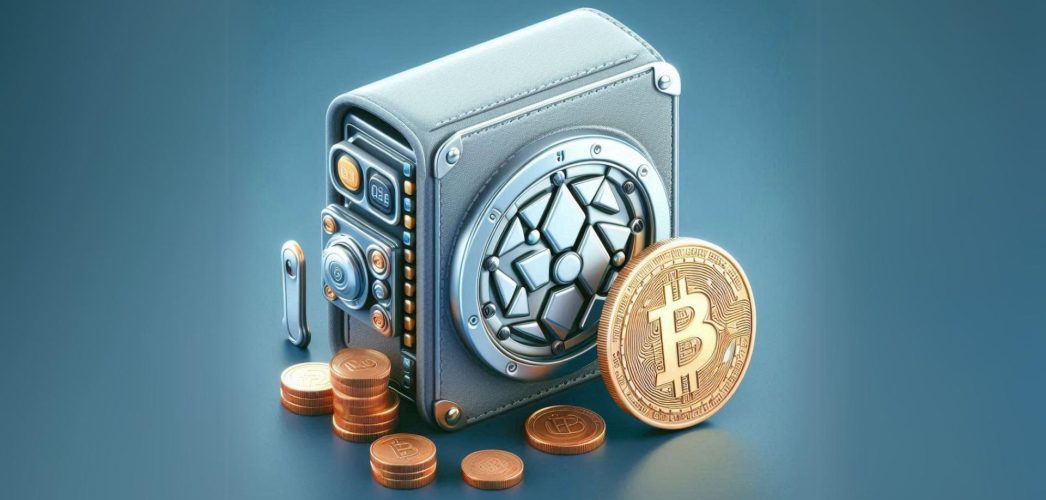The world of cryptocurrency has exploded in popularity in recent years. With the rise of Bitcoin, Ethereum, and countless other digital assets, a new era of financial opportunity has opened its doors. However, this exciting landscape also comes with inherent risks.
Just like securing your home or protecting your credit card details, safeguarding your cryptocurrency is paramount. Unfortunately, the digital realm presents unique security challenges. Breaches and hacks targeting cryptocurrency exchanges and wallets have become a disturbing trend.
In this blog post, we’ll delve into the power of cold storage, a security measure that empowers you to take back control of your crypto holdings. We’ll explore why traditional hot wallets may not be enough, the various cold storage options available, and how to implement them for ultimate peace of mind.
By the end of this journey, you’ll be equipped with the knowledge and confidence to secure your cryptocurrency with the utmost protection.
The Rise of a Booming Market
The cryptocurrency market has witnessed a meteoric rise in recent years. According to CoinGecko, the total market capitalization of all cryptocurrencies surpassed a staggering $3 trillion mark in November 2021 [1]. This explosive growth signifies a surge in investor interest and mainstream adoption.
However, with great opportunity comes great responsibility. As the value of cryptocurrency climbs, so too does the allure for cybercriminals.
The Dark Side: Crypto Hacks on the Rise
The decentralized nature of cryptocurrency offers numerous advantages, but it also presents a security challenge. Unlike traditional banks with robust security measures, cryptocurrency exchanges and wallets can be vulnerable to hacking attempts.
In 2021 alone, crypto-related hacks resulted in losses exceeding $6 billion [2]. These incidents highlight the critical need for robust security solutions to safeguard your hard-earned digital assets.
Why Hot Wallets Aren’t Enough: Understanding Your Options
Many new cryptocurrency investors opt for hot wallets as their primary storage solution. Hot wallets are software applications that allow you to store, send, and receive cryptocurrency directly on your computer, smartphone, or through online platforms.
While hot wallets offer convenient access to your crypto, they present significant security vulnerabilities:
Centralized Exchanges (CEXs): Convenience with Compromise
Centralized Exchanges (CEXs) are popular platforms that facilitate cryptocurrency trading. They offer a user-friendly interface and streamlined buying and selling experience. However, when you store your crypto on a CEX, you essentially relinquish control of your private keys to the exchange.
This centralization creates a security risk. If a CEX experiences a hack, your cryptocurrency holdings could be compromised. While reputable exchanges implement robust security measures, the risk remains.
Here’s a quote by Andreas Antonopoulos, a prominent Bitcoin advocate, that captures this sentiment: “Not your keys, not your coins.” This emphasizes the importance of holding your private keys for true ownership and security of your cryptocurrency.
Security Vulnerabilities of CEXs
CEXs are prime targets for hackers due to the vast quantities of cryptocurrency they hold. In 2021, a major cryptocurrency exchange, Coincheck, suffered a hack that resulted in the theft of over $500 million worth of digital assets [3].
While hot wallets offer a convenient way to access your crypto, they inherit the security risks associated with the platform they reside on.
Hot Wallets: Always-On Accessibility, Increased Risk
Beyond CEXs, there are various software-based hot wallets available. These can be downloaded applications for your computer or mobile device, or even web-based wallets accessed through a browser.
While hot wallets offer undeniable convenience for everyday transactions and quick access to your crypto, their constant internet connection makes them inherently more vulnerable than cold storage solutions. Here’s why:
-
Malware and Phishing Attacks: Hot wallets can be susceptible to malware that steals your login credentials or private keys. Phishing scams can also trick you into revealing your private information.
-
Exchange Hacks: If a hot wallet provider experiences a security breach, your crypto holdings could be compromised.
-
Centralized Points of Failure: Any software application, even those with strong security features, can have vulnerabilities.
While hot wallets serve a purpose for readily available crypto for transactions, they may not be suitable for storing large amounts of cryptocurrency, especially for long-term holdings.
Enter Cold Storage: Taking Control of Your Crypto Keys
Here’s where cold storage enters the scene. Cold storage wallets offer a superior level of security for your cryptocurrency by storing your private keys offline, completely isolated from the internet. This significantly reduces the risk of hacking and unauthorized access.
Imagine your cold storage wallet as a digital vault, a secure fortress protecting your valuable crypto assets. Unlike hot wallets that are “always on” and connected to the internet, cold storage disconnects your private keys from the online world, creating an air gap that significantly strengthens security.
The Benefits of Cold Storage: Unparalleled Security
By taking your crypto assets offline with cold storage, you gain several key advantages:
-
Offline and Immune to Hacking: Cold storage wallets eliminate the vulnerability of online attacks. Since your private keys are never exposed to the internet, they are virtually immune to hacking attempts, malware, and phishing scams.
-
Private Keys Remain in Your Control: With cold storage, you retain complete control over your private keys. This empowers you to manage your cryptocurrency independently, without relying on a third party.
Cold storage offers peace of mind, knowing that your valuable crypto holdings are shielded from online threats.
Here’s an inspirational quote by Bill Gates that resonates with the concept of taking control of your digital assets: “The future of all financial transactions will be invisible, frictionless, and digital.” Cold storage empowers you to be an active participant in this future, safeguarding your crypto assets with confidence.
We’ll explore the different types of cold storage wallets available and how to choose the right one for your needs in the next section.
Different Types of Cold Storage Wallets
Cold storage isn’t a one-size-fits-all solution. There are two main types of cold storage wallets, each with its own advantages and considerations:
1. Hardware Wallets: A Physical Fortress for Your Crypto
Hardware wallets are essentially dedicated electronic devices designed specifically for offline cryptocurrency storage. They resemble a small USB flash drive and offer a high level of security. Popular hardware wallet brands include Ledger and Trezor.
Here are some key benefits of hardware wallets:
- Enhanced Security: Hardware wallets utilize secure chips and PIN codes to protect your private keys. Even if a hacker gains access to your device, the private keys remain encrypted.
- Transaction Signing: Hardware wallets allow you to confirm transactions directly on the device, adding an extra layer of security compared to software confirmations on a computer.
- Durability: Many hardware wallets are built with rugged materials, offering protection against physical damage and even water exposure.
2. Paper Wallets: A Simple, Low-Tech Option
Paper wallets are a more basic form of cold storage. They involve generating a private key and public address pair offline and then printing them out on a piece of paper. This paper then becomes your bearer asset, similar to holding physical cash.
Here’s what makes paper wallets attractive:
- Simplicity: Paper wallets are the most straightforward option for cold storage. They require minimal technical knowledge and are relatively inexpensive.
- Durability: Paper wallets can be quite durable if stored properly. Laminating the paper and keeping it in a safe deposit box can further enhance its longevity.
However, paper wallets also come with some drawbacks to consider:
- Vulnerability to Damage: Paper itself is susceptible to physical damage from fire, water, or even wear and tear.
- Loss Risk: If you lose your paper wallet, you lose access to your cryptocurrency permanently.
- Transaction Complexity: Sending cryptocurrency from a paper wallet can be a more complex process compared to hardware wallets.
Choosing the right cold storage solution depends on your individual needs and risk tolerance. For large amounts of cryptocurrency or long-term holdings, hardware wallets offer superior security. For smaller amounts or those seeking a simple, low-tech option, paper wallets can be a viable solution.
Using Cold Storage: A Step-by-Step Guide
Now that you understand the power of cold storage and the different options available, let’s explore how to implement it for your own cryptocurrency holdings.
Here’s a breakdown of the process:
1. Choosing the Right Cold Storage Wallet:
Consider your needs and risk tolerance. If you’re a seasoned investor with significant crypto holdings, a hardware wallet like Ledger or Trezor might be the ideal choice. If you’re new to the space or have a smaller amount of crypto, a paper wallet could be a suitable option.
2. Setting Up Your Cold Storage Wallet:
This will vary depending on your chosen method.
-
Hardware Wallets: Typically involve downloading the manufacturer’s software, initializing the device, and setting a strong PIN code. The device will then guide you through generating a recovery seed phrase, a crucial backup for your private keys. Write down this seed phrase on a piece of paper and store it securely offline in a safe location.
-
Paper Wallets: There are various online tools that allow you to generate a private key and public address pair offline. Once generated, you can print them out on a clean sheet of paper. Remember, treat this paper wallet with the same care you would give physical cash.
3. Transferring Your Cryptocurrency:
Once your cold storage wallet is set up, you’ll need to transfer your cryptocurrency from your existing hot wallet or exchange. This involves using the public address generated by your cold storage wallet to initiate the transfer.
4. Ongoing Management:
With cold storage, your cryptocurrency is safely isolated offline. You can still monitor your holdings using blockchain explorers online, but any transactions will require connecting your cold storage device or using the private key from your paper wallet (with caution).
Remember, cold storage is all about taking control of your private keys. Ensure you understand the recovery process for your chosen cold storage solution and store your backups securely.
The Final Word: Taking Back Control with Confidence
By implementing cold storage, you’re reclaiming ownership and control of your cryptocurrency assets. Here’s what you gain:
-
Peace of Mind Through Enhanced Security: Cold storage significantly reduces the risk of hacking and unauthorized access, offering unparalleled security for your valuable crypto holdings.
-
Empowering Yourself in the Crypto Space: Taking control of your private keys empowers you to be a self-sufficient participant in the cryptocurrency ecosystem. You’re no longer reliant on third-party platforms for the safekeeping of your digital assets.
Cold storage isn’t without its drawbacks. Hardware wallets require a one-time investment, and both methods necessitate a bit more technical understanding compared to hot wallets. However, the security benefits far outweigh these considerations, especially for those with significant crypto holdings or a long-term investment perspective.
By taking the time to understand cold storage and implementing the steps outlined above, you can ensure your cryptocurrency holdings are safeguarded with the utmost protection. This empowers you to navigate the exciting world of crypto with confidence and peace of mind.
Scentia Research Group: Empowering Your Blockchain Journey
At Scentia, we are passionate about helping blockchain projects succeed. We understand the intricacies of the cryptocurrency landscape and the importance of robust security measures.
Our team of experts can leverage qualitative research methodologies to identify and address potential security vulnerabilities within your blockchain project. This proactive approach can mitigate risks and ensure the long-term success of your endeavor.
**Download our latest whitepaper, “Whitepaper Leveraging Qualitative Research for Blockchain Security A Comprehensive Guide” to learn more about how Scentia can empower your blockchain journey.
Here are some additional resources you may find helpful:
- Ledger Hardware Wallets: https://www.ledger.com/
- Trezor Hardware Wallets: https://trezor.io/trezor-model-t
- BitAddress (Paper Wallet Generator): https://www.bitaddress.org/
We hope this blog post has equipped you with the knowledge and confidence to explore the power of cold storage and take control of your cryptocurrency holdings.
FAQs
1. What are the risks associated with hot wallets?
Hot wallets offer convenience but come with inherent security risks. These include:
- Malware and phishing attacks: Malicious software can steal your login credentials or private keys, while phishing scams can trick you into revealing them.
- Exchange hacks: If a hot wallet provider experiences a security breach, your crypto holdings could be compromised.
- Centralized points of failure: Any software application, even those with strong security features, can have vulnerabilities.
2. How much does a cold storage wallet cost?
The cost of a cold storage wallet varies depending on the type. Hardware wallets typically range from $50 to $200, while paper wallets are essentially free (though there may be costs associated with printing and storage).
3. Is cold storage difficult to use?
Hardware wallets require a bit more technical setup compared to hot wallets, but the process is generally straightforward and user-friendly. Paper wallets are even simpler but come with their own considerations.
4. What happens if I lose my cold storage device?
With hardware wallets, recovery is possible if you have your seed phrase securely stored. Paper wallets, however, offer no recovery option if lost or damaged.
5. Can cold storage wallets store all types of cryptocurrency?
Most cold storage wallets support a wide range of popular cryptocurrencies. However, it’s always recommended to check compatibility with your specific crypto holdings before purchasing a cold storage solution.





